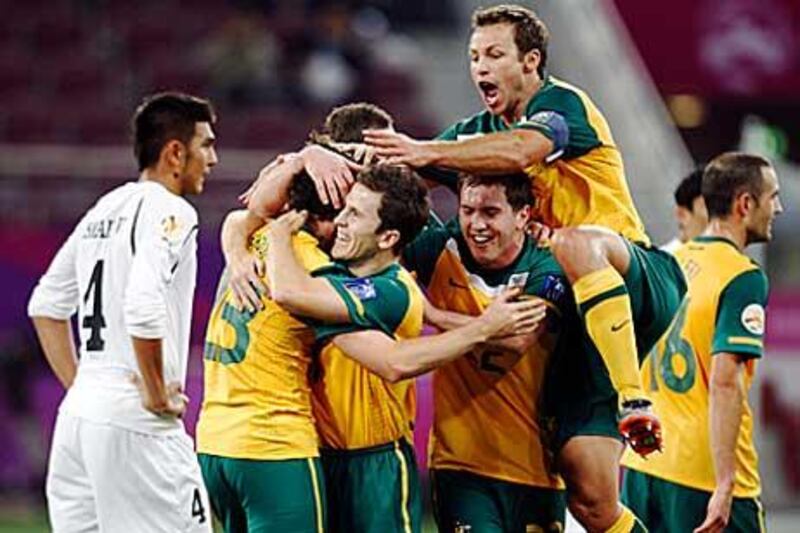DOHA // Australia are the newest members of the Asian Football Confederation, but they already are changing the continent's balance of power.
They reached the knockout round in their first Asian Cup, in 2007, a year after joining the confederation, and they were just warming up.
Two years later, they completed a romp through Asian qualifying for the 2010 World Cup, and last night they reached the championship match of the 2011 Asian Cup with a 6-0 rout of Uzbekistan.
The Aussies clearly present Asian clubs with dilemmas they do not normally see: size, brute force, superior skill in the air and a sort of rugby-like physicality.
They made good use of all those advantages in the destruction of the Uzbeks, the clear favourite of the Khalifa Stadium crowd of 24,826 - at least until the Socceroos made a mockery of the game in the second half and Uzbekistan supporters hustled for the exits, hoping to flee the dreadful scene before Australia scored again.
Old Asia's last chance at stopping the Aussies comes on Saturday when Japan, penalty shoot-out victors over South Korea earlier in the day, meet Holger Osieck's side in the final match of the championship.
Harry Kewell, Sasa Ognenovski, David Carney, Brett Emerton, Carl Valeri and Robbie Kruse all scored for Australia, who had not enjoyed an easy match since dispatching India 4-0 back on January 10.
Australia certainly earned this victory, but the Uzbeks' craven capitulation in the final half-hour was embarrassing to watch.
The Aussies laboured 118 minutes before scoring a goal in their previous game, and they had not managed more than one strike since India, four games before, banking on their muscular defence to carry them through.
Last night, they had a goal in the third minute and a second in the 34th for a 2-0 lead at half time.
The first was a simple give-and-go between Kewell and the midfielder Matt McKay.
Kewell was near the touchline when he angled a pass to McKay, who advanced into space as Kewell sprinted forward on his left.
McKay, who was to set up three goals, rolled the ball into Kewell's path and the Galatasaray striker carried it inside the corner of the box before putting a left-footed shot inside the far post, and the Aussies were off and running.
Goal number two came off a restart, a more typical scoring scenario for the Aussies.
Carney, the left-back, looped a soft ball into a knot of players about 10 yards in front of goal, and Tim Cahill nodded it back in front of goal.
Ognenovski, reigning Asian Player of the Year, caught it on one bounce with a left-footed side swing and bounced it past Timur Juraev, who was to show himself more a phantom than a goalkeeper.
The Uzbeks clearly missed Alexander Geynrikh, their cool and clever playmaker, who had gone out in the 70th minute of the previous game with what appeared to be a leg injury, though it is hard to imagine he would have made a six-goal difference.
Uzbekistan also was without its first-choice goalkeeper.
Ignatiy Nesterov took several hard knocks in the 2-1 quarter-final win over Jordan and had been substituted in the 62nd minute.
He hardly could have done worse than Juraev, whose nightmare night ended with Kruse's shot rolling through his hands.
The referee was the Emirati Ali Hamad al Badwawi, a familiar figure in this tournament, and his first assistant was another Emirati, Saleh Mohammed al Marzouqi.
Al Badwawi was busy, showing six yellow cards and a red to the Uzbek defender Ulugbek Bakaev in the 67th minute, when he was caught head-butting one of the Aussies. When Bakaev departed, the score was only 3-0.





